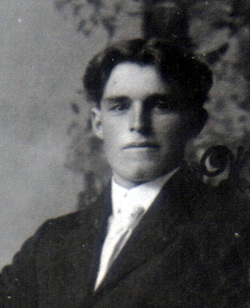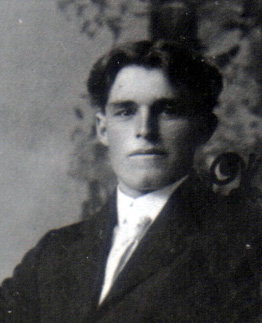"Jeff" was the son of William Wilson Compton and Nancy Carter Compton (cousins). On 14 April, 1902, he married Mary Catherine "Kate" Shannon.
His autobiography:
"T.J. Compton, son of Wm. Wilson Compton and Nancy Carter Compton was born November 10, 1858. I cannot help feeling indifferent to writing anything pertaining to my own life's history, as I never kept any diary of my time, trips and experiences, so I haven't much material to begin with. I was born, raised and worked on a farm in Bland Co., Va. until I was about twenty three, and in the fall of 1882 migrated to Barton Co., Kans. where I engaged in teaching school. Oweing to prevaling drouths in Kans. I moved to Gentry Co., Mo. in the spring of 1883 and the following fall and winter taught school near Civil Bend, Mo. after which I took a course in Telegraph and Business at a college in Sedalia, Mo. Leaving there in 1885, I returned to Kansas and was engaged in farming for a short time, then going to Great Bend Kans. I spent the year 1886 as a real estate agent locating claim hunters. Barton Co. was yet in the pioneer stage, the big herders had about stopped coming from Texas and was being driven to Dodge City. Barton Co. had received a very heavy migration of Germans from Europe, and when one went to town, he was in the midst of a bable of tongues, speaking many different languages. Great Bend in those days, was like living in some foreign country, and on Saturdays every body came to town and often as many as six hundred teams could be counted parked at or around the public square and nearby places. The stores became jammed with excited and very talkative mob-like crowds of humanity. Saturdays were real show days in great Bend to the "New comer" as well as to the Natives. It was all a very exciting kind of life, and I learned to like and admire the pioneer class of people that worked so hard to build up a home for their selves and families and most of them met with success... Living on a claim in a prairie country is a lazyman's life, yet one finds plenty to do, breaking up some sod and planting to Kaffir corn, about the only thing we could raise on it successfully, and that sometimes was a failure. Soon after making this settlement, I had the call to go south, where I found employment on a big cotton plantation at Ashwood, La. This was another exciting kind of life among the Southern Darkeys, and I found them in what is known as the "Black Belt of La.," about forty miles below Vicksburg on the Mississippi River. The bottom lands around Ashwood are among the most fertile in La. Ashwood Landing was only a shipping place for the cotton and cottonseed from nearby plantations, but at times the shipping business was a very rushing one, sometimes a night and day business, sometimes with the loading up of some three or four big barges with cotton and cotton seed at a time. My time here was given to clerking in the store, telegraphing, bookkeeping and running the Post office, which kept me busy. Pay day for the week day hands was on Saturdays, and the big rush would come on Saturday night, and as usual thing, I had charge of the paying off, and, as most of laborers received good wages, they had plenty of money to spend. My life in L. was a very pleasant one, a delightful climate and a hunter's paradise and above all, the people are, as a class, the most amiable and neighborly people I have every met. Soon after opening up of the Cherokee Strip in Okla., I went out there to take up a claim. [In the 1900 census, he shows up near his brother Millard Lee Compton in Noble Co., OK.] There again I became a pioneer among the early settlers of the Strip country, where I remained until 1902 [Brother Millard died August 1902], then I left for Mo. I was often asked why I came to Mo. Well I guess it was all because I had met Miss Kate Shannon, and I liked the climate here, so remained to marry this Miss Mary Kate Shannon, daughter of Wm. and Jane Shannon, on April 24, 1902, and have been living here very happy ever since, most of the time farming. My last word - I have not been able to record the many pleasant stories associated with those relative with whom I became so intimately acquainted, but they have been revived and will live on, and you cannot pass a richer heritage to your children than a record of the legends and traditions of your family. It is a duty to your family that you give them a complete record of their ancestors as possible. It will furnish them a grateful and lasting memory of you. Cordially yours, T.J. Compton."
Shortly after his wife Jane died (1946), on Jan 12, 1947, he wrote to Katherine Perry Davidson Thompson of Bland Co., Virginia,from his home in Hale, MO: "This is a dark, dreary day. Snow almost gone. I am feeling time. Jim McDaniels, my cook, is about to go sick and as Belle is gone, guess I'll have to do my own cooking." He died of coronary thrombosis.
"Jeff" was the son of William Wilson Compton and Nancy Carter Compton (cousins). On 14 April, 1902, he married Mary Catherine "Kate" Shannon.
His autobiography:
"T.J. Compton, son of Wm. Wilson Compton and Nancy Carter Compton was born November 10, 1858. I cannot help feeling indifferent to writing anything pertaining to my own life's history, as I never kept any diary of my time, trips and experiences, so I haven't much material to begin with. I was born, raised and worked on a farm in Bland Co., Va. until I was about twenty three, and in the fall of 1882 migrated to Barton Co., Kans. where I engaged in teaching school. Oweing to prevaling drouths in Kans. I moved to Gentry Co., Mo. in the spring of 1883 and the following fall and winter taught school near Civil Bend, Mo. after which I took a course in Telegraph and Business at a college in Sedalia, Mo. Leaving there in 1885, I returned to Kansas and was engaged in farming for a short time, then going to Great Bend Kans. I spent the year 1886 as a real estate agent locating claim hunters. Barton Co. was yet in the pioneer stage, the big herders had about stopped coming from Texas and was being driven to Dodge City. Barton Co. had received a very heavy migration of Germans from Europe, and when one went to town, he was in the midst of a bable of tongues, speaking many different languages. Great Bend in those days, was like living in some foreign country, and on Saturdays every body came to town and often as many as six hundred teams could be counted parked at or around the public square and nearby places. The stores became jammed with excited and very talkative mob-like crowds of humanity. Saturdays were real show days in great Bend to the "New comer" as well as to the Natives. It was all a very exciting kind of life, and I learned to like and admire the pioneer class of people that worked so hard to build up a home for their selves and families and most of them met with success... Living on a claim in a prairie country is a lazyman's life, yet one finds plenty to do, breaking up some sod and planting to Kaffir corn, about the only thing we could raise on it successfully, and that sometimes was a failure. Soon after making this settlement, I had the call to go south, where I found employment on a big cotton plantation at Ashwood, La. This was another exciting kind of life among the Southern Darkeys, and I found them in what is known as the "Black Belt of La.," about forty miles below Vicksburg on the Mississippi River. The bottom lands around Ashwood are among the most fertile in La. Ashwood Landing was only a shipping place for the cotton and cottonseed from nearby plantations, but at times the shipping business was a very rushing one, sometimes a night and day business, sometimes with the loading up of some three or four big barges with cotton and cotton seed at a time. My time here was given to clerking in the store, telegraphing, bookkeeping and running the Post office, which kept me busy. Pay day for the week day hands was on Saturdays, and the big rush would come on Saturday night, and as usual thing, I had charge of the paying off, and, as most of laborers received good wages, they had plenty of money to spend. My life in L. was a very pleasant one, a delightful climate and a hunter's paradise and above all, the people are, as a class, the most amiable and neighborly people I have every met. Soon after opening up of the Cherokee Strip in Okla., I went out there to take up a claim. [In the 1900 census, he shows up near his brother Millard Lee Compton in Noble Co., OK.] There again I became a pioneer among the early settlers of the Strip country, where I remained until 1902 [Brother Millard died August 1902], then I left for Mo. I was often asked why I came to Mo. Well I guess it was all because I had met Miss Kate Shannon, and I liked the climate here, so remained to marry this Miss Mary Kate Shannon, daughter of Wm. and Jane Shannon, on April 24, 1902, and have been living here very happy ever since, most of the time farming. My last word - I have not been able to record the many pleasant stories associated with those relative with whom I became so intimately acquainted, but they have been revived and will live on, and you cannot pass a richer heritage to your children than a record of the legends and traditions of your family. It is a duty to your family that you give them a complete record of their ancestors as possible. It will furnish them a grateful and lasting memory of you. Cordially yours, T.J. Compton."
Shortly after his wife Jane died (1946), on Jan 12, 1947, he wrote to Katherine Perry Davidson Thompson of Bland Co., Virginia,from his home in Hale, MO: "This is a dark, dreary day. Snow almost gone. I am feeling time. Jim McDaniels, my cook, is about to go sick and as Belle is gone, guess I'll have to do my own cooking." He died of coronary thrombosis.
Family Members
-
![]()
Martha Ellen Compton Ashworth
1844–1922
-
![]()
Capt Jasper Watson Compton
1846–1891
-
![]()
Mary Jane Compton Bruce
1848–1921
-
![]()
Francis Marion Compton
1850–1936
-
![]()
John Allen Compton
1852–1921
-
![]()
Matilda Catheryn "Callie" Compton Harman
1854–1914
-
![]()
James Buchanen Compton
1856–1898
-
![]()
Millard Lee Compton
1861–1902
-
![]()
Wylie Jackson Compton
1863–1929
-
Elvira Agnes L. Compton Beavers
1865–1937
Sponsored by Ancestry
Advertisement
Records on Ancestry
Advertisement



















